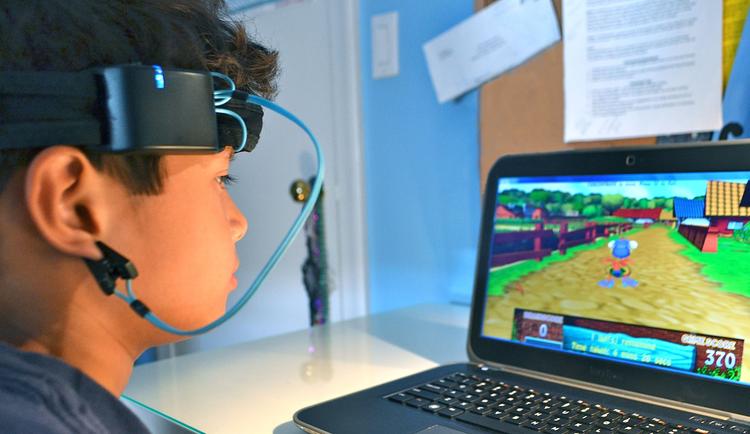Study: EEG-augmented brain training shows promise as first-line treatment for ADHD
 Novel Brain Training Game May Reduce Kids’ ADHD Symptoms (Medspace):
Novel Brain Training Game May Reduce Kids’ ADHD Symptoms (Medspace):
“A novel cognitive training computer game that uses a child’s own brain waves to improve concentration may reduce symptoms of attention-deficit/hyperactivity disorder (ADHD), say US researchers.
Investigators used a novel feed-forward modeling (FFM) system, which…is based on a computer cognitive training game in which attention is required to move an avatar through the game. The game was calibrated using an electroencephalogram (EEG) headband with three frontal sensors to create a model of attention and inattention states.
The results indicated that the FFM group experienced a 36% reduction in ADHD symptoms on the clinician-rated ADHD–Rating Scale. This improvement was maintained at 3‑month follow-up. There was a similar 31% reduction in symptoms reported by parents on the ADHD-RS Home Version, which was, again, maintained at 3‑month follow-up.”
Study: A Novel Feed-Forward Modeling System Leads to Sustained Improvements in Attention and Academic Performance (Journal of Attention Disorders)
- Objective: This study tested a novel feed-forward modeling (FFM) system as a nonpharmacological intervention for the treatment of ADHD children and the training of cognitive skills that improve academic performance.
- Method: This study implemented a randomized, controlled, parallel design comparing this FFM with a nonpharmacological community care intervention. Improvements were measured on parent- and clinician-rated scales of ADHD symptomatology and on academic performance tests completed by the participant. Participants were followed for 3 months after training.
- Results: Participants in the FFM training group showed significant improvements in ADHD symptomatology and academic performance, while the control group did not. Improvements from FFM were sustained 3 months later.
- Conclusion: The FFM appeared to be an effective intervention for the treatment of ADHD and improving academic performance. This FFM training intervention shows promise as a first-line treatment for ADHD while improving academic performance.
To learn more:


